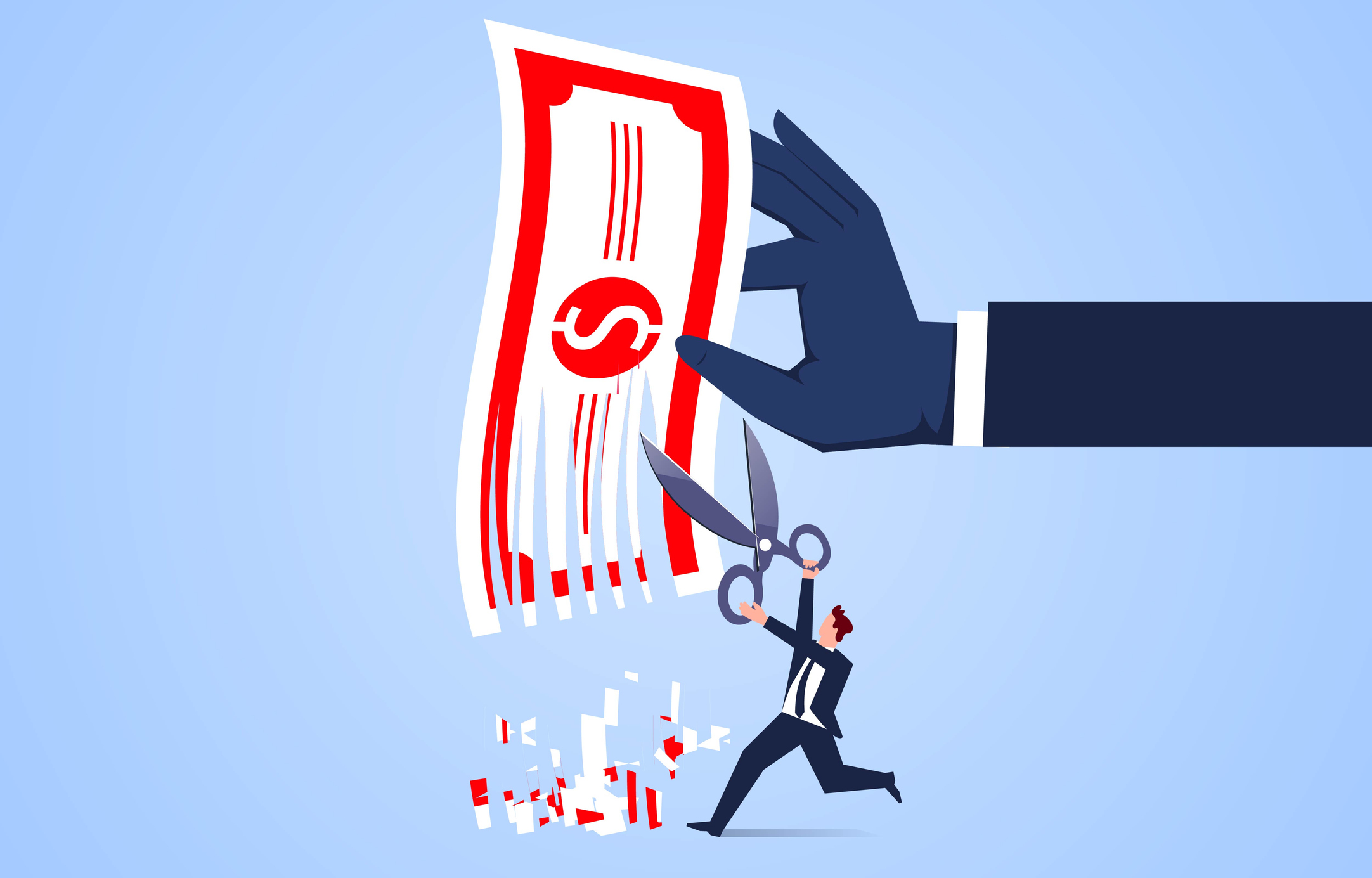Spending Cuts Could Trigger Deeper Slowdown: Kiplinger Economic Forecasts
There is a risk the debt limit could be hit as soon as June


Profit and prosper with the best of Kiplinger's advice on investing, taxes, retirement, personal finance and much more. Delivered daily. Enter your email in the box and click Sign Me Up.
You are now subscribed
Your newsletter sign-up was successful
Want to add more newsletters?
Our highly experienced Kiplinger Letter team assesses the state of the U.S. economy and the events affecting it, producing regular forecasts on the outlook for the economy, to help you make better financial decisions.
Our experienced Kiplinger Letter team will update you on all the important developments (Get a free issue of The Kiplinger Letter or subscribe). You will always get updates first by subscribing, but we will publish many (but not all) of the forecasts a few days afterward online. Here’s the latest…
If spending cuts are required to resolve the looming debt limit crisis, they will likely be moderate and/or spread out over time, so as not to ding current GDP growth too much. However, any cuts that take place at a time when the economy is slowing will likely make that slowdown a little worse.
From just $107.88 $24.99 for Kiplinger Personal Finance
Become a smarter, better informed investor. Subscribe from just $107.88 $24.99, plus get up to 4 Special Issues

Sign up for Kiplinger’s Free Newsletters
Profit and prosper with the best of expert advice on investing, taxes, retirement, personal finance and more - straight to your e-mail.
Profit and prosper with the best of expert advice - straight to your e-mail.
There is precedent for this sort of outcome. The 2011 debt limit fight between President Barack Obama and House Republicans resulted in $917 billion in cuts spread over 10 years, which reduced the immediate impact on the economy.
Lack of resolution to the debt crisis
But note that the White House is determined to avoid compromise, hoping instead that fissures in the GOP eventually drive moderates to its side. With no resolution, Uncle Sam can spend only the revenue coming in from taxes and other sources, triggering even more painful automatic spending cuts.
The timing of a potential crisis depends on June 15 quarterly tax payments. These could delay the moment of truth until late July or early August if they’re good. Otherwise, the debt limit would be hit in June, per recent Treasury Department warnings.
Troubles with manufacturing
Manufacturing’s April expansion doesn’t mean the sector is out of the woods, despite a benchmark survey showing improvement in orders, production, hiring and exports.
Other parts of the survey indicate a future slowdown: Businesses think customer inventories are too high, which happens only when a downturn is coming. Manufacturer inventories and order backlogs are also contracting.
Still, it’s likely that any slowdown will be gradual, a source of frustration for the Federal Reserve, which had hoped for faster relief of price pressures.
Manufacturers face a dilemma with their suppliers. Facing parts shortages in 2021 and 2022, many had expanded the number of suppliers they worked with to hedge against supply chain risk. With demand waning, they’ll face a tough choice between the hard-won diversification of their supplier bases and preserving cash.
This forecast first appeared in The Kiplinger Letter. Since 1923, the Letter has helped millions of business executives and investors profit by providing reliable forecasts on business and the economy, as well as what to expect from Washington. Get a free issue of The Kiplinger Letter or subscribe.
Read more
Profit and prosper with the best of Kiplinger's advice on investing, taxes, retirement, personal finance and much more. Delivered daily. Enter your email in the box and click Sign Me Up.

David is both staff economist and reporter for The Kiplinger Letter, overseeing Kiplinger forecasts for the U.S. and world economies. Previously, he was senior principal economist in the Center for Forecasting and Modeling at IHS/GlobalInsight, and an economist in the Chief Economist's Office of the U.S. Department of Commerce. David has co-written weekly reports on economic conditions since 1992, and has forecasted GDP and its components since 1995, beating the Blue Chip Indicators forecasts two-thirds of the time. David is a Certified Business Economist as recognized by the National Association for Business Economics. He has two master's degrees and is ABD in economics from the University of North Carolina at Chapel Hill.
-
 Americans, Even With Higher Incomes, Are Feeling the Squeeze
Americans, Even With Higher Incomes, Are Feeling the SqueezeA 50-year mortgage probably isn’t the answer, but there are other ways to alleviate the continuing sting of high prices
-
 Hiding the Truth From Your Financial Adviser Can Cost You
Hiding the Truth From Your Financial Adviser Can Cost YouHiding assets or debt from a financial adviser damages the relationship as well as your finances. If you're not being fully transparent, it's time to ask why.
-
 How to Manage a Disagreement With Your Financial Adviser
How to Manage a Disagreement With Your Financial AdviserKnowing how to deal with a disagreement can improve both your finances and your relationship with your planner.
-
 How AI Chatbots Can Secretly Give Biased Advice
How AI Chatbots Can Secretly Give Biased AdviceThe Kiplinger Letter “Poisoned” artificial intelligence can give untrustworthy advice about finance, health and lots more. Here’s how to fend off the growing threat.
-
 Farmers Brace for Another Rough Year
Farmers Brace for Another Rough YearThe Kiplinger Letter The agriculture sector has been plagued by low commodity prices and is facing an uncertain trade outlook.
-
 AI Sparks Existential Crisis for Software Stocks
AI Sparks Existential Crisis for Software StocksThe Kiplinger Letter Fears that SaaS subscription software could be rendered obsolete by artificial intelligence make investors jittery.
-
 Big Change Coming to the Federal Reserve
Big Change Coming to the Federal ReserveThe Lette A new chairman of the Federal Reserve has been named. What will this mean for the economy?
-
 A Scary Emerging AI Threat
A Scary Emerging AI ThreatThe Kiplinger Letter An emerging public health issue caused by artificial intelligence poses a new national security threat. Expect AI-induced psychosis to gain far more attention.
-
 An Inflection Point for the Entertainment Industry
An Inflection Point for the Entertainment IndustryThe Kiplinger Letter The entertainment industry is shifting as movie and TV companies face fierce competition, fight for attention and cope with artificial intelligence.
-
 The U.S. Economy Will Gain Steam This Year
The U.S. Economy Will Gain Steam This YearThe Kiplinger Letter The Letter editors review the projected pace of the economy for 2026. Bigger tax refunds and resilient consumers will keep the economy humming in 2026.
-
 Humanoid Robots Are About to be Put to the Test
Humanoid Robots Are About to be Put to the TestThe Kiplinger Letter Robot makers are in a full-on sprint to take over factories, warehouses and homes, but lofty visions of rapid adoption are outpacing the technology’s reality.